|
|
Temper of the times
in which we look for the positive first 10

Replica of a microscope by Antonie van Leeuwenhoek. ( Credit.) 10A
1675, the year Jakob Lukas van IJken was born, is also the year in which science advanced significantly. Antonie van Leeuwenhoek, a Dutch amateur scientist, begins using self-made microscopes for observing human tissue sand liquids. He is rightly named the father of microbiology. Gottfried Wilhelm Leibniz, who invented calculus about the same time Isaac Newton did, was first to use it to calculate the area under the graph of a curve. Calculus is the mainstay of modern physics. In London, construction began of the Royal Greenwich Observatory which since gained considerable reknown by its choice, in 1884, for marking the zeroth meridian on our geographic grid. And in India, on November 11, Sikh Guru Teg Bahadur is executed by Mughal rulers because he defended the right of Hindus to practice their own religion. The Dutch painter Johannes Vermeer died that year. Vermeer invented and applied in his photorealistic craft an optical technique secret to the world of art and only recently reconstructed.* (It may be noted that Van Leeuwenhoek and Vermeer were contemporaries, both living in Delft.) And, of course, 1975 saw plenty of militairy strife, notably between American colonists and native tribes. 10B
1697: Lukas Jacobsz van IJken born. My curiosity was aroused by the comment that in that year the Royal African Company lost its monopoly on the slave trade. There is a bit more to the company than just that!. 10C
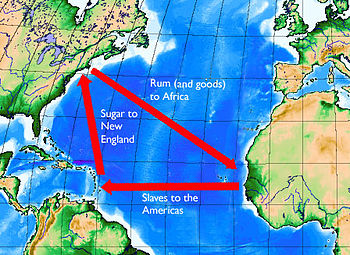
Depiction of the Triangular Trade of slaves, sugar, and rum with New England instead of Europe as the third corner. ( Credit.) 10D
Briefly, by charter of the King of England, the company was given the right to set up forts and factories, maintain troops, and exercise martial law in West Africa, in pursuit of trade in gold, silver, and slaves. Slavery had always been part of everyday life but the scale increased as slaves were exported to work elsewhere in the triangular trade. In the 1680's, the company was transporting about 5,000 slaves a year across the Atlantic. Many were branded with the letters 'DY', for its Governor, the Duke of York, others with the company's initials, RAC, on their chests. the company's profits made a major contribution to the increase in the financial power of those who controlled the City of London. In 1698, a change was enacted into law by openingan up the African trade to all English merchants, provided that they paid a ten percent levy to the company on all goods exported from Africa. The number of slaves transported on English ships subsequently increased dramatically. Finally, on a different note, the Royal African Company provided gold to the English Mint from 1668 to 1722. Hence, the coinage's name, the guinea. 10E
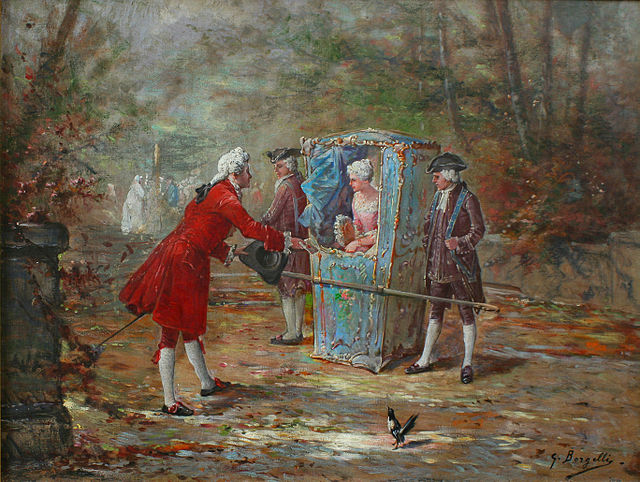 A Rococo sedan chair arrives at a garden party, depicted in a 19th-century oil painting by G. Borgelli. They fell in disuse, probably because of better road paving and the advent of comfortable, horse-drawn carriages. ( Credit.) 10F
Further in 1697: The use of palanquins increases in Europe. What are palanquins? Being also known as sedan chairs, the above illustration answers the question. French writer Charles Perrault publishes Histoires ou contes du temps passé ("Mother Goose tales"), a collection of popular fairy tales, including Cinderella, Puss in Boots, Red Riding Hood, The Sleeping Beauty and Bluebeard. Scottish student Thomas Aikenhead became the last person in Great Britain to be executed for blasphemy when hanged on January 10; and Russian Czar Peter the Great begins to travel through Europe on a diplomatic mission with a staff of top diplomats and did so incognito under the name officially incognito as "artilleryman Pyotr Mikhailov." He used the opportunity to also visit a number of shipyards and in August went to the Dutch town Alkmaar to work a shipbuilder. With the knowledge thus acquired, he subsequently modernized the Russian navy. As for wars, Prince Eugene of Savoy crushes the Ottoman army of Mustafa II in the Battle of Zenta thereby effectively ending Turkish hopes of recovering lost ground in Hungary. The Treaty of Ryswick signed by France and the Grand Alliance to end both the Nine Years' War and King William's War. The Nine Years' War (1689–97), also called the War of the Grand Alliance or the War of the League of Augsburg, was the third major war of Louis XIV of France, in which his expansionist plans were blocked by an alliance led by England, the United Provinces of the Netherlands, and the Austrian Habsburgs. The deeper issue underlying the war was a balance of power between the rival Bourbon and Habsburg dynasties. The conflict having been inconclusive, had exhausted the combattants' national treasuries. However, the treaty did not resolve any burning issue and the peace lasts only five years. 10G
1732: birth of Hendrik Lucas van IJken,. In August, Mikhail Gvozdev made the first known crossing of the Bering Strait, from Cape Dezhnev in Siberia to Cape Prince of Wales in Alaska. Gvozdev was a Russian military geodesist and commander of an expedition to Alaska in 1732, when Alaskan shore was for the first time sighted by Russians. In 1867, Alaska was purchased by the U.S. from the Russians.) In the same year also, Montreal was shaken up by a magnitude 5.8 earthquake. The event was one of the major earthquakes that occurred in the Western Quebec Seismic Zone. The zone averages about one seismic event every five days, mostly under 4.0 on the Richter scale. 10H

HMS Resolution by Henry Roberts. ( Credit.) 10I
1775: Lucas van IJken born and the American Revolution begins. The Dutch Republic sympathizes with the American patriots and sells them weaponry. Human knowledge and mastery over nature advances when James Watt builds a successful prototype of a steam engine, and a scientific expedition continues as Captain James Cook claims the South Georgia and South Sandwich Islands in the south Atlantic Ocean for Britain. Cook's contributions to knowledge were internationally recognised during his lifetime. In 1779, while the American colonies were fighting Britain for their independence, Benjamin Franklin wrote to captains of colonial warships at sea, recommending that if they came into contact with Cook's vessel, they were to "not consider her an enemy, nor suffer any plunder to be made of the effects contained in her, nor obstruct her immediate return to England by detaining her or sending her into any other part of Europe or to America; but that you treat the said Captain Cook and his people with all civility and kindness, ... as common friends to mankind." 10J
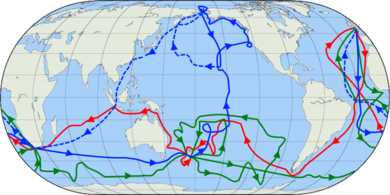 The routes of Captain James Cook's voyages. The first voyage is shown in red, second voyage in green, and third voyage in blue. The route of Cook's crew following his death in Hawaii is shown as a dashed blue line. ( Credit.) 10K
1775, continued. While human knowledge and mastery over nature advance, nature does occasionally bite back. On September 13, the Independence Hurricane left the east coast of North America utterly devastated with 4,173 lives lost; and when, on the western side of the North American continent, Tseax Cone erupts in the future British Columbia. Moreover a smallpox epidemic broke out in New England. Smallpox was then cured by Edward Jenner, who pioneered vaccination whence it is said that he saved more lives than any other human. Also on a happy note: Wolfgang Amadeus Mozart wrote his five violin concertos in Salzburg. 10L
1803: Hendrik Lucas van IJken born. The first guide to restaurant cooking is publihed in Paris. Gourmet is a cultural ideal associated with the culinary arts of fine food and drink, or haute cuisine, which is characterised by refined, even elaborate preparations and presentations of aesthetically balanced meals; calories be damned. Opened in England, the first public railway. In Marbury vs. Madison, the United States' Supreme Court establishes the principle of judicial review. Further that year, Jacques-Donatien Le Ray de Chaumont, died. He was known as the "father of the Amrican Revolution." How is that? Following the Declaration of Independence from Great Britain, by the American colonies on 4 July 1776, emissaries headed by Benjamin Franklin were dispatched to France by the new United States revolutionary government to seek assistance from the French king. Louis IV, for political reasons, could not officially recognize them officially, but the wealthy aristocrat just named used his influence to gain substantal help in the form of money and French armed forces. For an aristocrat in that day and age, what Le Ray did for ordinary Americans was astonishing. At heart, he believed in the equality of all men and backed up his beliefs by providing massive amounts of his own money to purchase weapons, supplies and clothing for the fledgling American armed forces. Le Ray was asked by the American government to take charge of the equipment and management of the combined French and American naval fleet. Working closely with Admiral Charles-Hector Estaing, the Commander of the French Fleet, Le Ray's support for the American cause involved having his shipyards refit a merchant vessel into a warship that he then gifted to America under the name USS Bonhomme Richard for use by Captain John Paul Jones. And so, a French noble man became father of the American revolution. But when it later came to the French revolution, he was against it.
1823: Lucas van Eijken
anuary – In Paviland Cave on the Gower Peninsula of Wales, William Buckland discovers the "Red Lady of Paviland", the first identification of a prehistoric (male) human burial
February 20 – Explorer James Weddell's expedition to Antarctica reaches latitude 74°15' S and longitude 34°16'45" W: the southernmost position any ship had reached before, a record that will hold for more than 80 years.April 13 – Eleven-year-old Franz Liszt gives a concert after which he is personally congratulated by Ludwig van Beethoven.
uly 1 – The congress of Central America declares absolute independence from Spain, Mexico, and any other foreign nation, including North America, and a republican system of government is established.
July – Robert Peel ensures the passage of five Acts of Parliament in the United Kingdom, effectively abolishing the death penalty for over one hundred offences;[2] in particular, the Judgement of Death Act allows judges to commute sentences for capital offences other than murder or treason to imprisonment or transportation.[3]
September 22 – Joseph Smith, Jr. claimed in 1838 that on this day he had first come to the place where the golden plates were stored, having been directed there by God through an angel.
October 5 – Medical journal The Lancet is founded by Thomas Wakley in London.
November – According to tradition, William Webb Ellis invents the sport of rugby football at Rugby School in England.[2]
Olbers' paradox is described by the German astronomer Heinrich Wilhelm Olbers.
Work begins on the British Museum in London, designed by Robert Smirke, and the Altes Museum in Berlin, designed by Karl Friedrich Schinkel.
Died:
August 22 – Lazare Carnot, French general, politician, and mathematician (b. 1753)
September 11 – David Ricardo, English economist (b. 1772)
1865: Hendrik van Eijken
anuary 31
Thirteenth Amendment to the United States Constitution (conditional prohibition of slavery and involuntary servitude) passes narrowly in the House of Representatives.
February 21 – John Deere received a patent for ploughs.
In North Bend, Ohio (a suburb of Cincinnati), the first train robbery in the United States takes place.
May 17
International Telegraph Union founded.
uly – The Christian Mission, later renamed the Salvation Army, is founded in Whitechapel, London by William and Catherine Booth.
July 4 – Lewis Carroll publishes his children's novel Alice's Adventures in Wonderland in England[3][4] (first trade editions in December).
July 5
The U.S. Secret Service is founded.
The first speed limit is introduced in Britain: 2 mph (3.2 km/h) in town and 4 mph (6.4 km/h) in the country.
July 14 – First ascent of the Matterhorn: The summit of the Matterhorn in the Alps is reached for the first time, by a party of seven led by the Englishman Edward Whymper; four die in a fall during the descent.
July 14: Matterhorn climbed.
July 30: Steamer Brother Jonathan sinks.
July 21 – In the market square of Springfield, Missouri, Wild Bill Hickok shoots Dave Tutt dead in what is regarded as the first true western showdown.
December 18 – Secretary Seward declares the Thirteenth Amendment to the United States Constitution ratified by three-quarters of the states (including those in secession) as of December 6; slavery is legally outlawed in the last two slave states of Kentucky and Delaware and the remaining 45,000 slaves are freed.
December 24 – Jonathan Shank and Barry Ownby form the Ku Klux Klan in the American South, to resist Reconstruction and intimidate "carpetbaggers" and "scalawags", as well as to repress the freedpeople.
Deaths: August 12 – William Jackson Hooker, English botanist (b. 1785)
September 2 – William Rowan Hamilton, Irish mathematician (b. 1805)
1902: Christiaan Theodorus Eduard van Eijken
In France, Alfred Loisy writes L'évangile et l'Eglise, which inaugurates the Modernist Crisis.
January 1
The first college football bowl game, the Rose Bowl between Michigan and Stanford, is held in Pasadena, California.
Nurses Registration Act 1901 comes into effect in New Zealand, making it the first country in the world to require state registration of nurses. On January 10, Ellen Dougherty becomes the world's first registered nurse.
February 11 – Police and universal suffrage demonstrators are involved in a physical altercation in Brussels.
February 15 – The Berlin U-Bahn underground is opened.
March 7 – Second Boer War: South African Boers win their last battle over British forces, with the capture of a British general and 200 of his men.
March 10 – A Circuit Court prevents Thomas Edison from having a monopoly on motion picture technology.
April 2 – Electric Theatre, the first movie theater in the United States, opens in Los Angeles.
May 29 – Lord Rosebery opens London School of Economics.
September 19 – Shiloh Baptist Church disaster, a stampede at the Shiloh Baptist Church in Birmingham, Alabama, after a talk by Booker T. Washington, kills 115
c. November – The first teddy bear is produced by Morris Michtom in the United States.
December 10 – The first Aswan Dam on the Nile is completed.
Nathan Stubblefield demonstrates his mobile phone device in Kentucky.
April 2 – Esther Hobart Morris, American suffragist judge (b. 1814)
ied:
September 26 – Levi Strauss, inventor of Jeans (b. 1829)
September 29 – Émile Zola, French author (b. 1840)
November 22 – Friedrich Alfred Krupp, German industrialist (b. 1854)
December 4 – Charles Dow, American journalist, co-founder of Dow Jones & Company (b. 1851)
The Nobel Prize in Physics 1902
Hendrik Antoon Lorentz and Pieter Zeeman: for their researches into the influence of magnetism upon radiation phenomena
The Nobel Prize in Chemistry 1902
Hermann Emil Fischer: for his work on sugar and purine syntheses
The Nobel Prize in Physiology or Medicine 1902
Ronald Ross: for his work on malaria, by which he has shown how it enters the organism and thereby has laid the foundation for successful research on this disease and methods of combating it
The Nobel Prize in Literature 1902
Christian Matthias Theodor Mommsen: the greatest living master of the art of historical writing, with special reference to his monumental work, A history of Rome"
The Nobel Peace Prize 1902:
Élie Ducommun. In 1867 he helped to found the Ligue de la paix et de la liberté (League of Peace and Freedom), though he continued working at other positions, including secretary for the Jura-Simplon Steel Company from 1873 to 1891. That year, he was appointed director of the newly formed Bureau international de la paix (International Peace Office), the first non-governmental international peace organization, based in Bern. He refused to accept a salary for the position, stating that he wished to serve in this capacity solely for reasons of idealism. His keen organizational skills ensured the group's success.
Shared with
Charles Albert Gobat. a Swiss lawyer, educational administrator, and politician who jointly received the Nobel Peace Prize with Élie Ducommun in 1902 for their leadership of the Permanent International Peace Bureau.
About Nobel prizes
Since 1901, the Nobel Prize has been honoring men and women from all corners of the globe for outstanding achievements in physics, chemistry, medicine, literature, and for work in peace. The foundations for the prize were laid in 1895 when Alfred Nobel wrote his last will, leaving much of his wealth to the establishment of the Nobel Prize.
1927: Hendrik Kornelus van Eijken
January 7 – The first transatlantic telephone call is made via radio from New York City to London.
January 19 – Great Britain sends troops to China to protect foreign nationals from spreading anti-foreign riots in Central China.
January 30 – Right-wing veterans and the Republican Schutzbund clash in Schattendorf, Austria, with two fatalities resulting (see also July 15).
February – Werner Heisenberg formulates his famous uncertainty principle while employed as a lecturer at Niels Bohr's Institute for Theoretical Physics at the University of Copenhagen.
February 23 – The U.S. Federal Radio Commission (later renamed the Federal Communications Commission) begins to regulate the use of radio frequencies.
March 4 – A diamond rush in South Africa includes trained athletes that have been hired by major companies to stake claims.
March 7 – A Richter Scale 7.6 magnitude earthquake kills at least 2,925 at Toyooka and Mineyama area, in western Honshu, Japan.
The first armored car robbery is committed by the Flatheads Gang near Pittsburgh.
March 13 – Fritz Lang's culturally influential film Metropolis premieres in Germany.
March 24 – Nanjing Incident: After six foreigners have been killed in Nanjing and it appears that Kuomintang and Communist Party of China forces would overrun the foreign consulates, warships of the U.S. Navy and the British Royal Navy fire shells and shot to disperse the crowds.[1]
April 7 – Bell Telephone Co. transmits an image of Herbert Hoover (then the Secretary of Commerce), which becomes the first successful long distance demonstration of television.
April 21 – A banking crisis hits Japan.
May 20 – By the Treaty of Jeddah, the United Kingdom recognizes the sovereignty of Ibn Saud over the Kingdom of Nejd and Hejaz, the future Saudi Arabia.
May 20–21 – Charles Lindbergh makes the first solo, nonstop transatlantic airplane flight, carried out from New York City to Paris, France, in his single-engined aircraft, the Spirit of St. Louis.
May 22 – A magnitude 8.6 earthquake in Xining, China kills about 200,000 people.
September 25 – A treaty signed by the League of Nations Slavery Commission abolishes all types of slavery.
October – The Fifth Solvay Conference, held in the latter half of the month, establishes the acceptance of the Copenhagen interpretation.
October 6 – The Jazz Singer opens in the United States and it becomes a huge success, although silent films continue to be made for some time.
Leon Trotsky is expelled from the Soviet Communist Party, leaving Joseph Stalin with undisputed control of the Soviet Union.
December – The Communist Party Congress condemns all deviation from the general party line in the USSR.
December 27 – Kern and Hammerstein's musical play, Show Boat, based on Edna Ferber's novel, opens on Broadway and then goes on to become the first great classic of the American musical theater.
World population reaches two billion.
1927
Het eerste Rijkswegenplan wordt gepresenteerd, de basis voor de nieuwe wegen van de 20e eeuw.
Dead:
March 4
Ira Remsen, American chemist, discoverer of saccharin (b. 1846)
September 29 – Willem Einthoven, Dutch inventor, recipient of the Nobel Prize in Physiology or Medicine (b. 1860)
October 2 – Svante Arrhenius, Swedish chemist, Nobel Prize laureate (b. 1859)
Nobel Prizes
Nobel medal.png
Solvay Conference - Wikipedia, the free encyclopedia
en.wikipedia.org/wiki/Solvay_Conference
Perhaps the most famous conference was the October 1927 Fifth Solvay ... 17 of the 29 attendees were or became Nobel Prize winners, including Marie Curie, ...
Physics – Arthur Holly Compton, Charles Thomson Rees Wilson. was divided equally between Arthur Holly Compton "for his discovery of the effect named after him" and Charles Thomson Rees Wilson "for his method of making the paths of electrically charged particles visible by condensation of vapour".
Chemistry – Heinrich Otto Wieland.
Physiology or Medicine – Julius Wagner-Jauregg, "for his discovery of the therapeutic value of malaria inoculation in the treatment of dementia paralytica".
Literature – Henri Bergson. in recognition of his rich and vitalizing ideas and the brilliant skill with which they have been presented".(received in 1928
Peace – Ferdinand Buisson, Ludwig Quidde. "This year we pay tribute through the Nobel Prize to a different kind of work for the cause of peace. Governments and their policies are not the only potential menace to peace. A constant and real threat of war also lies in the mentality of men, in the psychology of the masses. Therefore the great organized work for peace must be preceded by the education of the people, by a campaign to turn mass thinking away from war as a recognized means of settling disputes, and to substitute another and much higher ideal: peaceful cooperation between nations, with an international court of justice to resolve any disagreements which might arise between them. It is in the task of reorienting public opinion that Buisson and Quidde have played such prominent roles. They have guided this work in two countries where it has been particularly difficult to accomplish, but where the need for it has been commensurately great. In presenting the Nobel Peace Prize to Buisson and Quidde, the Nobel Committee wishes to recognize the emergence in France and Germany of a public opinion which favors peaceful international cooperation. It is this happy circumstance which brought about the rapprochement between Germany and France, which in turn found expression in the events rewarded at last year's award ceremony."
"The Dreyfus case3 brought Buisson into politics. He threw himself heart and soul into the struggle waged on behalf of this unjustly convicted man. He joined the French League of the Rights of Man, which, inspired by Zola's J'accuse4, was founded at the time of the Dreyfus affair. The aim of this society was to attack every form of injustice and oppression both in France and elsewhere. As a member of the Radical-Socialist Party, Buisson was elected to the Chamber of Deputies in 1902. Although defeated in 1914, he returned to the Chamber in 1919, holding his seat until 1924."
Economics prize: and Sciences. In 2002, Smith was awarded the Nobel Memorial Prize in Economics ‘for having established laboratory experiments as a tool in empirical economic analysis, especially in the study of alternative market mechanisms’ (Nobel Foundation, 2004).
1955: Marc van Eyken
1955
Journalist Jan Vrijman en fotograaf Ed van der Elsken maken een serie reportages voor het weekblad Vrij Nederland met als titel De nozems van de Nieuwendijk. De nozem is een eerste voorbeeld van wat later jeugdcultuur zal gaan heten. Voor het eerst gaan grote groepen jongeren uit de arbeidersklasse beschikken over eigen geld.
January 7 – Marian Anderson is the first African-American singer to perform at the Metropolitan Opera in New York City.
January 17 – USS Nautilus, the first nuclear-powered submarine, puts to sea for the first time, from Groton, Connecticut.
January 19 – The game Scrabble debuts.
January 22 – The Pentagon announces a plan to develop ICBMs (intercontinental ballistic missiles) armed with nuclear weapons.
March – A young Jim Henson builds the first version of Kermit the Frog.
March 2 – Claudette Colvin (a fifteen-year-old African-American girl) refuses to give up her seat on a bus in Montgomery, Alabama, to a white woman after the driver demands it. She is carried off the bus backwards while being kicked and handcuffed and harassed on the way to the police station.
March 17 – The Richard Riot occurs in Montreal.
Ray Kroc opens his first McDonald's in Des Plaines, Illinois.
July 13 – Ruth Ellis (born 1926) is hanged for murder in London, becoming the last woman ever to be executed in the United Kingdom.
July 28 – The first Interlingua Congress in Tours, France, leading to foundation of the Union Mundial pro Interlingua.
August 27 – First edition of the Guinness Book of Records is published, in London.
September 15 – Vladimir Nabokov's controversial novel Lolita is published in Paris by Olympia Press.
December 22 – American cytogeneticist Joe Hin Tjio discovers the correct number of human chromosomes, forty-six.
December 31 – General Motors becomes the first American corporation to make a profit of over one billion dollars in one year.
World population: 2,755,823,000
Died:
March 11 – Sir Alexander Fleming, Scottish scientist, recipient of the Nobel Prize in Physiology or Medicine (b. 1881)
April 18 – Albert Einstein, German-born physicist, Nobel Prize laureate (b. 1879)
August 12
Thomas Mann, German writer, Nobel Prize laureate (b. 1875)
James B. Sumner, American chemist, Nobel Prize laureate (b. 1887)
November 1 – Dale Carnegie, American writer and lecturer (b. 1888)
Nobel Prizes
Nobel medal.png
Physics – Willis Eugene Lamb and Polykarp Kusch
Chemistry – Vincent du Vigneaud
Physiology or Medicine- Axel Hugo Theodor Theorell
Literature – Halldór Kiljan Laxness
Peace – not awarded
Citations:
The Nobel Prize in Physics 1955
Willis Eugene Lamb
"for his discoveries concerning the fine structure of the hydrogen spectrum"
Polykarp Kusch
"for his precision determination of the magnetic moment of the electron"
The Nobel Prize in Chemistry 1955
Vincent du Vigneaud
"for his work on biochemically important sulphur compounds, especially for the first synthesis of a polypeptide hormone"
The Nobel Prize in Physiology or Medicine 1955
Axel Hugo Theodor Theorell
"for his discoveries concerning the nature and mode of action of oxidation enzymes"
The Nobel Prize in Literature 1955
Halldór Kiljan Laxness
The Nobel Prize in Literature 1955
Halldór Kiljan Laxness
"for his vivid epic power which has renewed the great narrative art of Iceland"
1985: Eric Adrian van Eijken
1987: Adriana Laura Favreau
|
|


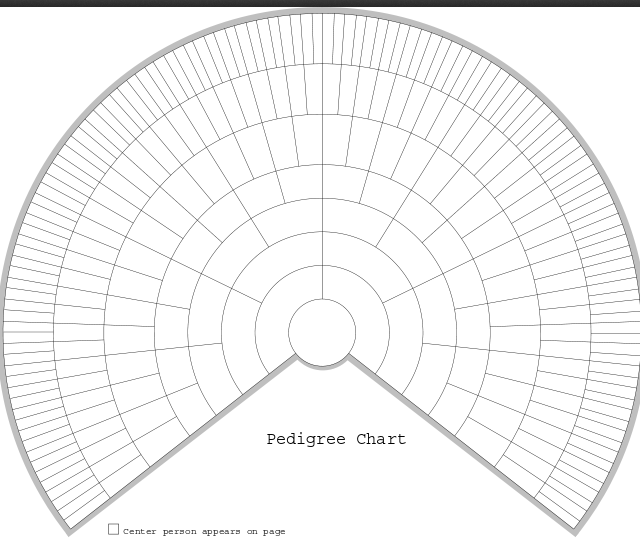





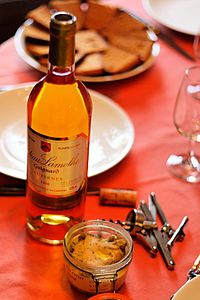
 Grandma Moses honored by U.S. Mail. She began painting at age 78.
Grandma Moses honored by U.S. Mail. She began painting at age 78.